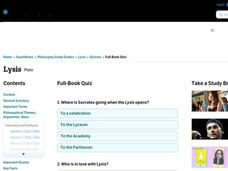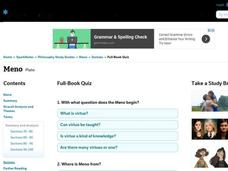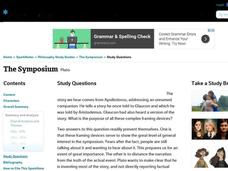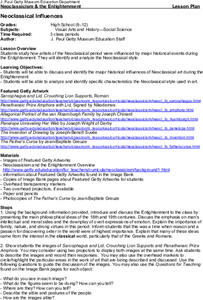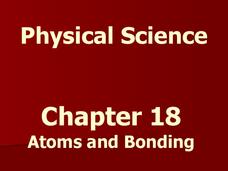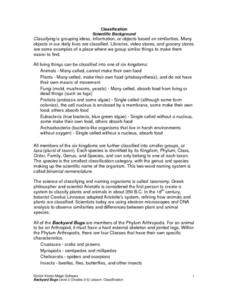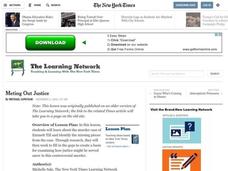Curated OER
Lysis
For this online interactive philosophy worksheet, students respond to 30 multiple choice questions about Lysis by Plato. Students may submit their answers to be scored.
Curated OER
Meno
In this online interactive philosophy activity, students respond to 15 multiple choice questions about Meno by Plato. Students may submit their answers to be scored.
Curated OER
The Symposium
In this online interactive philosophy instructional activity, students respond to 10 short answer and essay questions about The Symposium by Plato.
Curated OER
Primary History: Ancient Greeks - Athens
In this world history worksheet, students study the government of Athens, read surviving court cases, and try making a water clock. They read about Atlantis and design a plate showing the festivals of ancient Greece which they paint...
Curated OER
Children's Philosophy
Using children's books is an excellent way to introduce your students to the world of philosophy.
Curated OER
Ancient Atomic Theories
Studdnts research ancient texts and compare ancient Greek atomic theories, as used in the production of silver, to modern theories.
Education World
Human Nature- Good or Evil?
Students explore the philosophical nature of good vs. evil. In this literacy/philosophy instructional activity, students read and discuss media articles that illustrate human nature as inherently "good" or "evil." Students practice...
Curated OER
Italian Renaissance
Fifth graders explore the Italian Rensissance in this six lessons unit. The prominent citizens, the ideas, values, art, philosophy, and literature of the are seen as a rediscovery of Ancient Greek and Roman times.
Curated OER
Neoclassical Influences
Students identify artists of the Neoclassical period and how they were influenced by major historical events during the Enlightenment as well as identify the Neoclassical style.In this Neoclassical art lesson, students discuss...
Curated OER
Who Was Hippocrates?
In this Hippocrates worksheet, learners study and learn facts about the contribution of Hippocrates to medicine. After reading the one page text, students may answer 4 essay questions.
Pasco Middle School
AVID Socratic Seminar
Developed specifically for AVID students, this packet of materials that includes an explanation of the Socratic seminar, the preparation materials, and tips and protocols, is a must-have resource for any class.
Curated OER
House and Holmes: A Guide to Deductive and Inductive Reasoning
Test your pupils' reasoning skills with several activities and a quick mystery to solve. Learners watch and analyze a few video clips that demonstrate reasoning in action, practice deduction with an interactive and collaborative...
American Museum of Natural History
What is Astronomy?
Go study the universe. Pupils learn seven aspects about astronomy and astronomers. They begin to learn about constellations; distance and motion between objects; gravity; the electromagnetic spectrum; dark matter and energy; and teams of...
Curated OER
Intelligence in the Internet Age
Does technology affect our intelligence? Stefanie Olsen's article, "Intelligence in the Internet Age," and the thought provoking reading comprehension questions that follow, are sure to generate a lively discussion.
Curated OER
Tools of Persuasion
Ethos, pathos, and logos. After reading a passage about Aristotle's, three basic tools of persuasion, individuals answer a series of multiple choice comprehension questions and craft responses to three short-answer essay prompts.
Ohio Literacy Resource Center
Arguing with Aristotle Ethos, Pathos, Logos
Introduce your classes to the Art of Rhetoric with a lesson that focuses on Aristotle's persuasive appeals and how they have been used, both ethically and unethically, to influence opinion.
Mr. E. Science
Atoms and Bonding
I don't trust atoms because they make up everything. Budding scientists learn about famous scientists connected to atomic models, chemical, ionic, and hydrogen bonds. The presentation also presents how to count atoms in an equation,...
National Institute of Open Schooling
Atomic Structure
Learners explain historical findings such as Rutherford and Bohr's contributions, explain wave particle duality, and formulate Heinsenberg's uncertainty principle. They also draw s, p, and d orbitals, explain more historical findings,...
Curated OER
Explore the Mathematics of the Explorers
Columbus and other explorers relied upon mathematical calculations using the Earth, stars, and ships speeds.
Curated OER
Flying with Pythagoras
A lengthy narrative about Pythagoras and his students precedes an activity in which your young mathematicians practice using the Pythagorean theorem to solve three problems about flight and distance. Answers are provided.
Curated OER
Backyard Bugs
Explore the concept of scientific classification and the similarities and differences between plant and animal species. Your class will participate in hands-on activities by investigating dichotomous keys and classifying their shoes. To...
Curated OER
Day Six: Bible A Tribute to the One True God - Athens
Students study the Bible to understand the importance of impacting another's life and being able to walk in their shoes. In this Bible study lesson students role play and discuss Acts from the Bible.
Curated OER
Meting Out Justice
Students investigate the murder case of Emmett Till and identify the missing pieces from the case. Through research, they then work to fill in the gaps to create a basis for examining how justice might be served anew in this...
Curated OER
Building a Better Argument
Students create good arguments by exploring the basic structure of an arguments. They determine premises and conclusions for analyzing the effectiveness of arguments. In addition, they explore the differences between arguments and...
Other popular searches
- Ancient Greek Philosophers
- Natural Greek Philosophers
- Greek Philosophers Cicero
- Greek Philosophers V
- Greek Philosophers Vein
- Greek Philosophers, Cicero
- The Greek Philosophers


